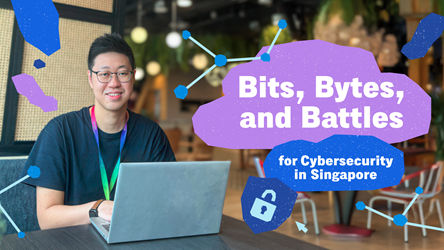Women In Public Sector Engineering
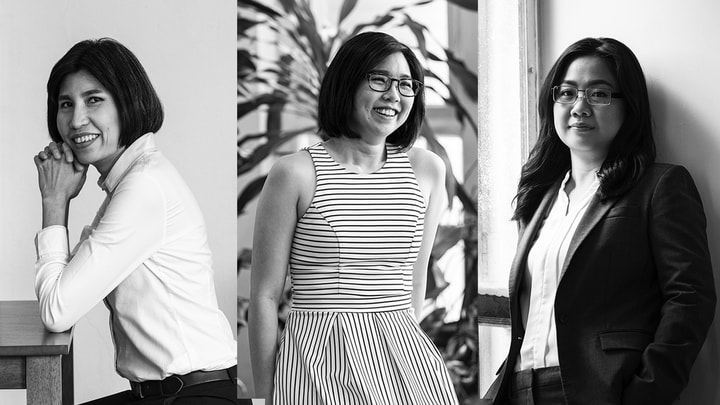
Teo Hui Ying
Principal Surveyor
Survey & Geomatics Division
Singapore Land Authority (SLA)
Using data captured from state-of-the-art aerial imagery and light detection and ranging (LIDAR) sensors on board aircraft and moving vehicles, SLA principal surveyor Teo Hui Ying produces high-quality 3-D maps. These national maps support government agencies in their planning, risk management, operations and policy formulation.
The maps have helped national water agency PUB to build a terrain model for accurate flood risk management, and the Civil Aviation Authority of Singapore to plan flight paths and monitor height obstacles around airports.
The Urban Redevelopment Authority, Housing and Development Board (HDB) and JTC also use these maps to carry out large-scale urban simulations, for example, to determine how public spaces can be shaded in tropical Singapore.
This rising trend of using accurate digital map data and models is testament to geomatics engineering’s contribution in building a resilient, sustainable and smart nation.
As a young girl, Ms Teo had always been interested in technology and the outdoors. Her previous jobs as a technical officer and land surveyor at the Land Transport Authority offered her a chance to travel around Singapore, both to far-flung forested areas and dense urban areas.
Yet not many have heard of the term “geomatics engineering” and “land surveying”, she bemoans, or do not understand their contributions to society.
Ms Teo explains that geomatics engineering involves the collection, processing, analysis, management, distribution and presentation of geographic data into meaningful geo-information.
Land surveying, she adds, is critical in ensuring that any construction starts on the "right foot", and that structures are in the correct position throughout the entire construction process.
“Often, in the construction sector, this is the least recognised profession compared to civil engineers, architects or quantity surveyors,” she says. “People have the impression that land surveyors carry their equipment and work under the hot sun in dirty or busy construction sites.”
With digitisation and technology, however, land surveyors are increasingly working in a more office-based data processing environment, says Ms Teo, who undertook a second national aerial mapping project in early 2019. Apart from the day-to-day technical aspects, the “soft” side of her job includes capacity building and creating awareness of this role to aspiring young engineers.
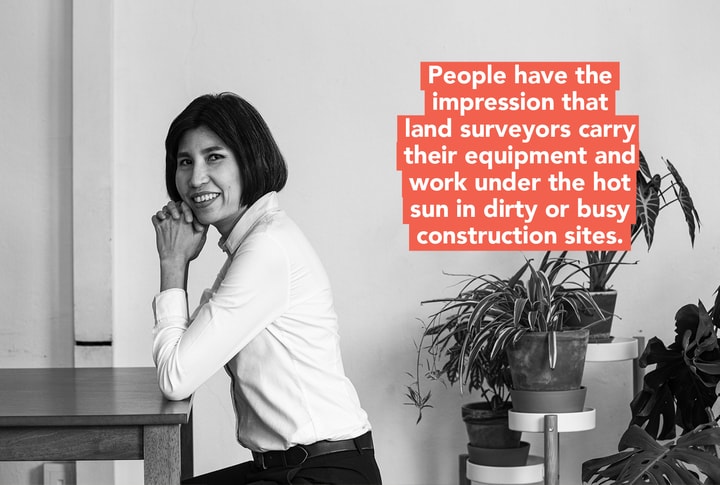
Lock Yanni
Assistant Director (Cluster Development)
Industry Development & Promotion Office
National Environment Agency (NEA)
Making strides in the field of sustainability is NEA officer Lock Yanni, an environmental engineer who is helping Singapore move forward in its quest for a cleaner environment. What motivates her in this mission is the ability to spur the development of technology and use it to transform the environmental sector.
In her department, Ms. Lock is a technical lead for the GovPACT Programme, where the government works with SMEs and start-up companies to develop and test innovative solutions.
Playing a “middleman” role, she learns about the challenges in the environmental services industry and solicits solutions from technology providers to propose solutions. She then reviews, assesses and provides feedback to these companies on how they can become commercially viable.
To get the job done, Ms. Lock is equipped with knowledge in areas such as the Internet of Things, artificial intelligence, robotics and automation in the waste management, cleaning and pest management industries.
Most projects she is involved with are geared towards improving the skillsets and job productivity of workers. An example is the development of a robotic cleaner for kitchen exhaust ducts that frees workers from having to crawl through confined ducts. The robot can also clean vertical ducts more easily. Another solution is an integrated autonomous sweeper with surveillance features, combining cleaning and security functions in one platform.
These innovations “create tremendous value to the facilities management industry, which is facing challenges in labour shortage and productivity,” Ms Lock explains.
Ms Lock has been a long-time champion who advocates for the green lifestyle. In her previous work with NEA’s Sustainability Office and as deputy chairman of the Eco-Office Committee, she took the lead in slashing NEA’s consumption of water, electricity and paper by 10%.
Under her watch, she promoted green events like Earth Hour and World Water Day within the NEA and successfully convinced the organisation to switch to energy- and water-efficient lighting and air conditioning fixtures. Towards this end, she also engages with solar consultants and the HDB on the feasibility of placing solar panels for NEA’s premises.
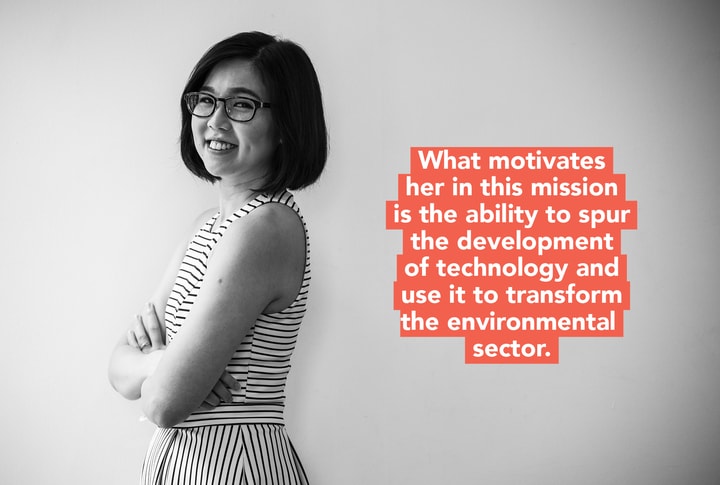
Dr Tan Mei Hui
Cyber Security Specialist, Cyber Security Group
Government Technology Agency (GovTech)
Cybersecurity expert Tan Mei Hui travelled to various secondary all-girls schools over the past year talking to students about cybersecurity as a career option.
Next January, she will be taking it a step further with one-on-one mentorship with selected students, in the hope of inspiring the next generation of female cybersecurity specialists.
To inject more diversity into what has been a male-dominated industry, Dr Tan is eager to show how women can be equally equipped to become engineers and take on related jobs in consulting and business development.
“I have been lucky to have great mentors, so I see this mentorship as a form of paying it forward,” says Dr Tan, who is from GovTech’s Cyber Security Group that protects the nation’s IT infrastructure and data. “I would tell the students to keep an open mind and never stop learning.”
These mentorship efforts are part of her involvement with the Association of Information Security Professionals’ (AiSP) Ladies in Cybersecurity Initiative. A prominent advocate for technology and innovation, Dr Tan was also invited to speak at key international forums such as Google I/O conference, Women Techmakers and Microsoft Tech Summit.
She also holds an executive committee role on the Singapore Computer Society’s Infocomm Security Chapter. There, she mentors tertiary students and young professionals pursuing cybersecurity as a profession on topics such as ethical hacking and security operations.
No stranger to a career switch, Dr Tan’s background is in electrical and computer engineering. She then pursued her PhD in machine learning and computer vision, before she was hired a senior consultant at Deloitte Singapore and a cyber risk assurance manager at PwC Singapore.
This on-the-job training and constant learning paved the way for her move from a research-driven work to her current role at GovTech, where she helps in the design, implementation, operationalisation and thought leadership of cybersecurity operations.
"My role requires familiarity with coding, security design and architecture,” she points out. “Our team also has diverse backgrounds, with specialties ranging from economics and mathematics to the sciences."
While her specialisation in machine learning, electrical and computer engineering are not directly part of cybersecurity, she says these are critical skills in the highly interdisciplinary cybersecurity field.
Major challenges in cybersecurity include ever-evolving threats and having to stay ahead of the latest trends and technologies, says Dr Tan. And she is game for it all, keen to solve problems for the good of society.
“Cybersecurity is a core component of national defence,” she points out. “My aim in life is to be able to make a positive difference in technology and the cyberspace safer for everyone.”
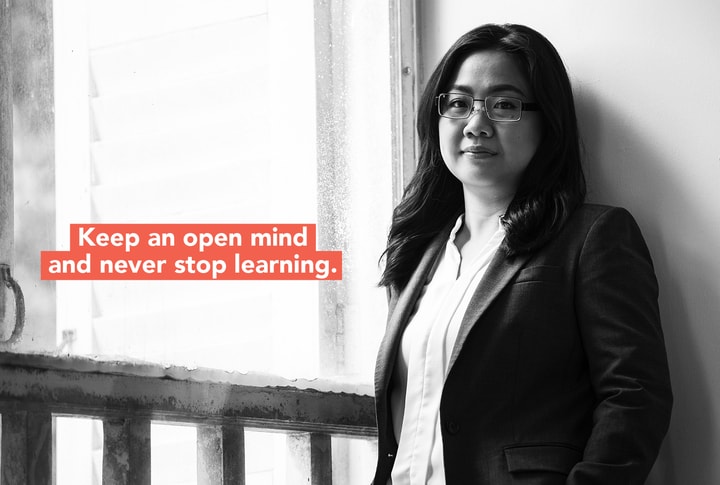
The takeaway
- With the right training and exposure on top of keen personal interest, anyone can be equipped to take on engineering roles.
- Many engineering and technology roles are interdisciplinary and require a diverse mix of skills and experiences.
- Always be open to opportunities for new career moves and contributing to a better work environment.
- POSTED ON
Dec 3, 2019
- TEXT BY
Toh Ee Ming
- PHOTOS BY
Kevin Yang
- ART DIRECTION BY
Yip Siew Fei







